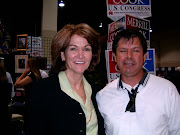 by Chelsea Warren - 14 Oct 2008
by Chelsea Warren - 14 Oct 2008Modern-day Minutemen call Utahns to action and rally people to defend the U.S. border.
The Utah Minuteman Project, an organization of Utah citizens dedicated to protecting the U.S. against illegal immigration, prepares to travel to the Arizona/ Mexico border this weekend to help local border watch groups on patrol.
Utah State House Representatives Stephen Sandstrom (R-Orem) and Chris Herrod (R-Provo) will accompany them.
Eli Cawley, chairman of the board of the UMP, stressed the importance of this event, which is known as a muster, in supporting border watch organizations.
"It is important for us to be aware and to lend a hand," Cawley said.
The Minutemen go down twice a year, in April and October, to help watch the border and receive first-hand education on the issues of border control.
Participants in this event pay their own way, which has an estimated cost between $600 and $1,200. Five-time muster participant Norm Davis said the financial contribution is "no small commitment."
Muster members lend their eyes and ears to border patrol members to cover the wide stretches of desert terrain.
"We provide support as observers for these agents covering 15-20 mile stretches," said Davis, the elected chairman of standing subcommittees for UMP.
Minuteman participation in these musters has drawn criticism from several community groups, including officials in Arizona border patrol.
"We do not support what the Minutemen do and they are not invited to our musters," said Mario Escalante, public affairs officer for the Tucson sector of the U.S. border patrol. "Not only do we have to worry about someone smuggling people or dope across the border, but you have to worry about this civilian putting themselves in harm's way. It makes our job that much more difficult."
Davis said the participants act only as observers and do not participate in the dangerous aspects of suspect apprehension.
Community member Alex Segura founded the Utah Minuteman Project in response to the increased frequency of illegal immigration and its effects on the community, Cawley said.
"This organization is important for people to know about because we are one of the only ones battling for our language, culture and borders for our children and grandchildren," Cawley said. "People say 'diversity this' or 'compassion that,' but it comes down to battling for our nation."
The UMP board of directors comprises Hispanic and other non-white members, which Cawley said defies any ideas that they might be a prejudice-based group.
"La Raza y MIChA say we are terrible monsters and racists," Davis said. "We love Mexican people; we just don't want illegals in our country."
University of Utah MIChA organization member Denise Cantaeda said she personally understands the Minuteman reasoning for going to the border, but that the work is better left to trained professionals.
The forefront issue in illegal immigration is not one of race, Davis said, but one of respecting the law and going about appropriate channels to obtain entry into the U.S.
"I have family members from China and Germany who paid thousands of dollars to get a green card legally," Davis said. "They respected the law and sacrificed to get here."
http://nn.byu.edu/story.cfm/69806
































